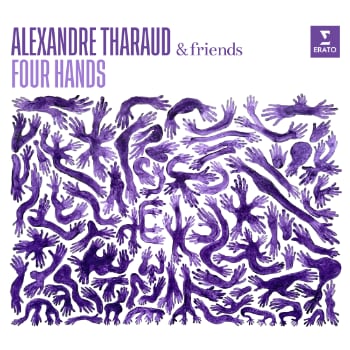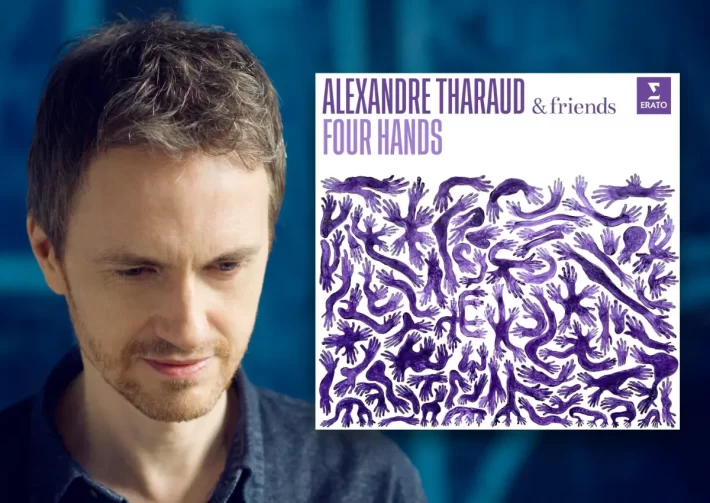Alexandre Tharaud has a solid collection of solo albums to his credit but he’s also an avid collaborative musician: from songs with soprano Sabine Devieilhe to works for flute and cello, he’s explored an array of styles and composers. This collection of piano music for four hands features partnerships with a good number of pianists alongside artists that piano is not their primary instrument; and so pianists like Bruce Liu, Beatrice Rana, Vikingur Ólafsson, Bertrand Chamayou, David Fray, and Alexander Melnikov is joined on the piano bench by cellist Gautier Capuçon, singer-songwriter Juliette Noureddine, and countertenor Philippe Jaroussky.
The album includes 22 short works, the longest being 6 minutes long and the shortest less than a minute. Other than Tharaud, none of the music partners appears more than once, which points to a complicated and ambitious production. Tharaud starts with Brahms’ popular Hungarian Dance in F# minor with Bruce Liu. Although the tempo is brisk, the pianists feed off each other’s energy. Liu, who takes the primo part, shows nimble if not a tad light-handed finger-work in the fast passages, while Tharaud fuels the rhythmic baseline.
Next up is a sharp shift in character to the peaceful Bach cantata (BWV 106) arranged by Gyrogy Kurtág. Tharaud takes the primo part with David Fray in the supporting role. The primo part needs to sing more, especially when it hits the higher registers; Tharaud’s tone quality, while undeniably delicate, has a transparency that translates into fragility. We move to the world of Piazzolla in the following selection (track 3): Beatrice Rana, who takes the first part here, adds some flair to her part to underscore the tango mood. The composition and arrangement are already helter-skelter, so some will feel this performance uncomfortably frenetic.
Given that both Tharaud and Bertrand Chamayou have both recorded Maurice Ravel’s complete piano works, it only makes sense that they team up here with the composer’s Jardin Féerique (track 6) from the Mother Goose Suite. Both pianists have clearly capitalized on their familiarity with the composer, as this is a fine performance indeed. Tharaud’s melodic material adjusts seamlessly between rich and hymlike in the beginning to gossamer and translucent in the middle, and finally, full and sparkling in the closing glissandi. Meanwhile, Chamayou provides an accompaniment appropriately understated yet present, so that Ravel’s signature harmonies can be appreciated.
On the note of Impressionist works, there is also Claude Debussy’s En Bateau (track 17) with Frédéric Vaysse-Knitter on the primo part. The duo captures the playful innocence of the music, especially through the sprightly staccatos; in the recapitulation, they also bring out the beautiful textural and motivic layers that Debussy adds to the original thematic material. Their version differs considerably from the recent rendition by Lang Lang and Gina Alice, whose tempo is much more relaxed and captures a very different side of the work, one that is much more atmospheric and dreamy. However divergent, both versions are equally lovely.
While there aren’t many contemporary works, we do have Philip Glass’ Stokes (track 18), which features the unmistakeable harmonic and minimalistic trademarks of the composer. This might be one of the most exciting works on the album, with the Tharaud and Vanessa Wagner working together to navigate the suspenseful and dynamic musical landscape. While some other selections may have sounded cautious, this one fortunately doesn’t.
The program is intelligently and refreshingly curated to include audience favorites and a few lesser known composers and works. It’s also nice to see an album that features the collaborative efforts of pianists whom we normally hear in more exclusive contexts. The booklet includes a generous interview with Tharaud and a lovely collage of photos of the performers, seeming to have a good time participating in the project.
Image: ©️ Jean-Baptiste Millot


Check offers of this album on Amazon.
Album Details |
|
|---|---|
| Album name | “Four Hands” |
| Artist | Alexandre Tharaud et al |
| Label | Erato / Warner Classics |
| Catalogue No. | 5054197933523 |
| Amazon Music link | Stream here |
| Apple Music link | Stream here |

















